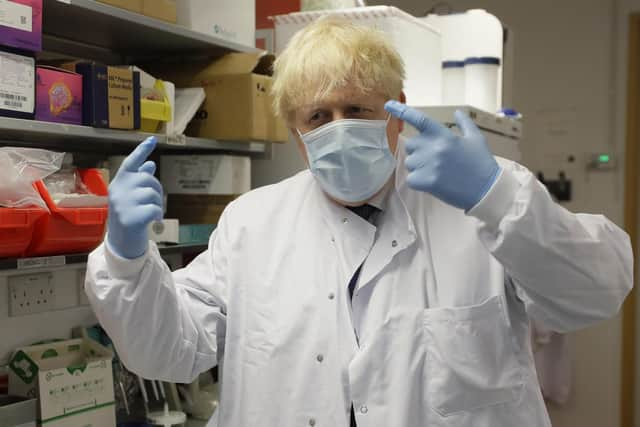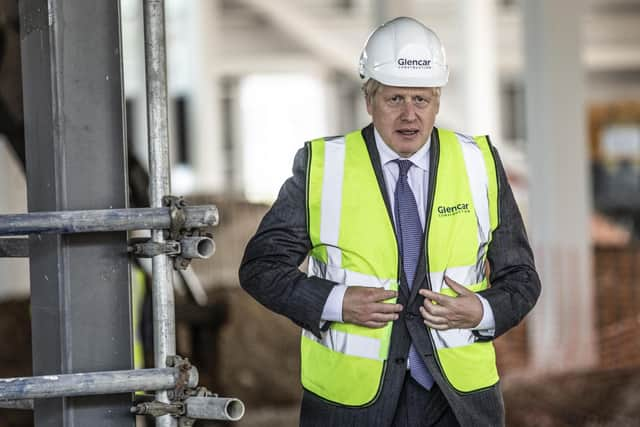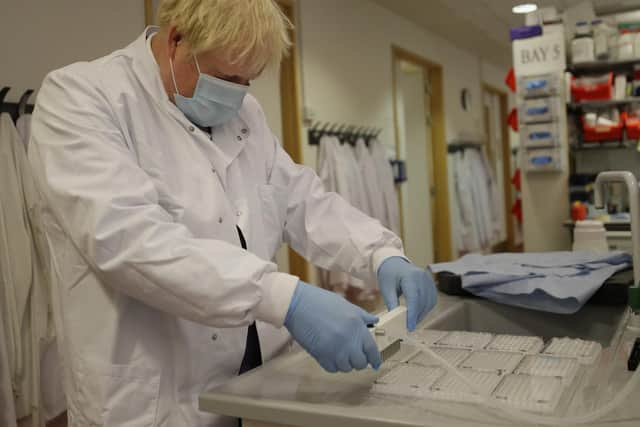PM: Second lockdown is 'last thing anybody wants' but current measures to be kept 'under review'
and live on Freeview channel 276
Parts of West Yorkshire which had previously been lifted out of local restrictions will be put back under a ban on socialising at home from Tuesday, amid fears over growing rates.
It means around 13.5m people will be under some sort of restrictions relating to coronavirus.
Advertisement
Hide AdAdvertisement
Hide AdAnd while Health Secretary Matt Hancock said a national lockdown is the “last line of defence”, he added it had not been ruled out, with the “great hope” that people will heed current advice to help manage a “very serious” situation.


He said: “We want to avoid a national lockdown but we’re prepared to do it, if we need to.”
New confirmed daily cases of coronavirus hit 4,322 today – the highest since May 8 - and cases of the virus and hospital admissions for Covid-19 are doubling every seven to eight days in the UK, according to the new data.
Yvonne Doyle, medical director at Public Health England, said: “This could be a warning of far worse things to come.”
Advertisement
Hide AdAdvertisement
Hide AdOn a visit to the Jenner Institute in Oxford today, where a coronavirus vaccine is being developed, Prime Minister Boris Johnson said his administration was considering whether it needed to “go further” than the current national restrictions that were put in place this week.


Asked about the possibility of a two-week October half-term in order to bring in a short lockdown, Mr Johnson told reporters: “What I can certainly say about parents and schools is we want to keep the schools open, that is going to happen.
“We want to try and keep all parts of the economy open as far as we possibly can – I don’t think anybody wants to go into a second lockdown but clearly when you look at what is happening, you have got to wonder whether we need to go further than the ‘rule of six’ that we have brought in on Monday, so we will be looking at the local lockdowns we have got in large parts of the country now, looking at what we can do to intensify things that help bring the rate of infection down there, but also looking at other measures as well.
“What I will say is, as we go forward, we will be explaining in great detail to people what the scientific background is, what the epidemiology is saying and really how we propose to do it.”
Advertisement
Hide AdAdvertisement
Hide AdHe added a second lockdown was the “last thing anybody wants” but said the current measures would need to be kept “under review”.


It comes after Yorkshire saw more restrictions imposed as the full districts of Bradford, Kirklees, and Calderdale would be covered by strict rules banning socialising in private homes, while Selby and Scarborough were added to the list of areas of concern.
The new rules will come into place from Tuesday, and Mr Hancock said: “Local leaders in these areas have asked for stronger restrictions to be put in place to protect local people, and we are acting decisively to support them.”
But Kirklees Council leader Shabir Pandor said he had not asked for the restrictions and was writing to the Government to ask for them to be reversed.
Advertisement
Hide AdAdvertisement
Hide AdWhile Susan Hinchliffe, leader of Bradford Council, said although she still felt the whole district should be freed from restrictions, now was not the time to “undermine the public health professionals’ advice”.
She said: “My position as leader has not changed since last week in that I advocated for the whole district to come out of local restrictions and revert to the clearer national guidelines, backed up by a plan for more testing, local test and trace, community engagement and support for the low paid to self-isolate.
“Public health professionals locally and nationally however were concerned that what we are advocating as a way forward is not yet in place to give them the assurance that we can do without local restrictions.”
A Department of Health and Social Care spokesperson said: “We work closely with local leaders and public health teams to inform decisions on local interventions, taking into account a range of factors.
Advertisement
Hide AdAdvertisement
Hide Ad“Public Health England, the Joint Biosecurity Centre, and NHS Test and Trace are constantly monitoring the levels of infection across the country and Kirklees is in the top 30 local authorities by incidence rate in England.
“We discuss measures with local Directors of Public Health and local authorities, constantly reviewing the evidence and we will take swift targeted action where necessary.”
Meanwhile, Leeds City Council had asked the Government for permission to introduce a curfew in hospitality venues, but this was denied.
The city had been rumoured to be on the list of places facing new restrictions, but this did not come to pass.
Advertisement
Hide AdAdvertisement
Hide AdSpeaking in the Lords, Yorkshire peer Lord Scriven said: “Whitehall does not always know best. Today we hear that in Yorkshire the city of Leeds asked for one very limited restriction to deal with the virus, but the Government said no, as they did not think that it could work or would be best for that area. Why was this the case?”